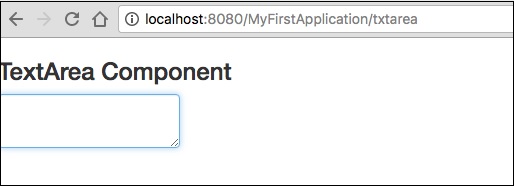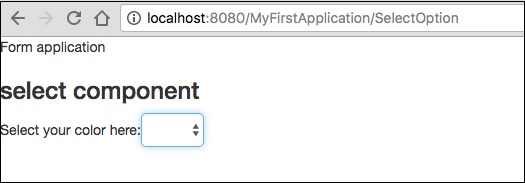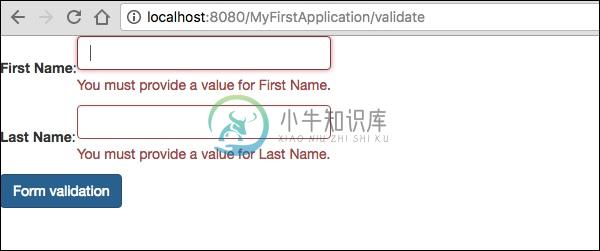表单和验证组件(Forms & Validation Components)
Form Component用于在tapestry页面中创建用于用户输入的表单。 表单可以包含文本字段,日期字段,复选框字段,选择选项,提交按钮等。
本章详细介绍了一些值得注意的表单组件。
复选框组件
Checkbox Component用于在两个互斥选项之间进行选择。 使用Checkbox创建页面,如下所示 -
Checkbox.java
package com.example.MyFirstApplication.pages;
import org.apache.tapestry5.annotations.Property;
public class Checkbox {
@Property
private boolean check1;
@Property
private boolean check2;
}
现在,创建一个相应的模板Checkbox.tml ,如下所示 -
<html t:type = "newlayout" title = "About MyFirstApplication"
xmlns:t = "http://tapestry.apache.org/schema/tapestry_5_4.xsd"
xmlns:p = "tapestry:parameter">
<h3> checkbox component</h3>
<t:form>
<t:checkbox t:id = "check1"/> I have a bike <br/>
<t:checkbox t:id = "check2"/> I have a car
</t:form>
</html>
这里,checkbox参数id与相应的布尔值匹配。
Result - 请求页面后,http:// localhost:8080/myFirstApplication /复选框产生以下结果。

TextField组件
TextField组件允许用户编辑单行文本。 创建页面Text如下所示。
Text.java
package com.example.MyFirstApplication.pages;
import org.apache.tapestry5.annotations.Property;
import org.apache.tapestry5.corelib.components.TextField;public class Text {
@Property
private String fname;
@Property
private String lname;
}
然后,创建一个相应的模板,如下所示 - Text.tml
<html t:type = "newlayout" title = "About MyFirstApplication"
xmlns:t = "http://tapestry.apache.org/schema/tapestry_5_4.xsd"
xmlns:p = "tapestry:parameter">
<p> Form application </p>
<body>
<h3> Text field created from Tapestry component </h3>
<t:form>
<table>
<tr>
<td>
Firstname: </td> <td><t:textfield t:id = "fname" />
</td>
<td>Lastname: </td> <td> <t:textfield t:id = "lname" /> </td>
</tr>
</table>
</t:form>
</body>
</html>
这里,Text页面包含一个名为fname和lname的属性。 组件ID由属性访问。
请求页面将产生以下结果 -
http://localhost:8080/myFirstApplication/Text

PasswordField组件
PasswordField是密码的专用文本字段条目。 创建页面密码如下所示 -
Password.java
package com.example.MyFirstApplication.pages;
import org.apache.tapestry5.annotations.Property;
import org.apache.tapestry5.corelib.components.PasswordField;
public class Password {
@Property
private String pwd;
}
现在,创建一个相应的模板文件如下图所示 -
Password.tml
<html t:type = "newlayout" title = "About MyFirstApplication"
xmlns:t = "http://tapestry.apache.org/schema/tapestry_5_4.xsd"
xmlns:p = "tapestry:parameter">
<p> Form application </p>
<h3> Password field created from Tapestry component </h3>
<t:form>
<table>
<tr>
<td> Password: </td>
<td><t:passwordfield t:id = "pwd"/> </td>
</tr>
</table>
</t:form>
</html>
这里,PasswordField组件具有参数id,它指向属性pwd 。 请求页面将产生以下结果 -
http://localhost:8080/myFirstApplication/Password

TextArea组件
TextArea组件是一个多行输入文本控件。 创建一个页面TxtArea,如下所示。
TxtArea.java
package com.example.MyFirstApplication.pages;
import org.apache.tapestry5.annotations.Property;
import org.apache.tapestry5.corelib.components.TextArea;
public class TxtArea {
@Property
private String str;
}
然后,创建相应的模板文件,如下所示。
TxtArea.tml
<html t:type = "newlayout" title = "About MyFirstApplication"
xmlns:t = "http://tapestry.apache.org/schema/tapestry_5_4.xsd"
xmlns:p = "tapestry:parameter">
<h3>TextArea component </h3>
<t:form>
<table>
<tr>
<td><t:textarea t:id = "str"/>
</td>
</tr>
</table>
</t:form>
</html>
这里,TextArea组件参数id指向属性“str”。 请求页面将产生以下结果 -
http://localhost:8080/myFirstApplication/TxtArea**

选择组件
Select组件包含一个选项下拉列表。 创建一个SelectOption页面,如下所示。
SelectOption.java
package com.example.MyFirstApplication.pages;
import org.apache.tapestry5.annotations.Property;
import org.apache.tapestry5.corelib.components.Select;
public class SelectOption {
@Property
private String color0;
@Property
private Color1 color1;
public enum Color1 {
YELLOW, RED, GREEN, BLUE, ORANGE
}
}
然后,创建相应的模板如下 -
SelectOption.tml
<html t:type = "newlayout" title = "About MyFirstApplication"
xmlns:t = "http://tapestry.apache.org/schema/tapestry_5_4.xsd"
xmlns:p = "tapestry:parameter">
<p> Form application </p>
<h3> select component </h3>
<t:form>
<table>
<tr>
<td> Select your color here: </td>
<td> <select t:type = "select" t:id = "color1"></select></td>
</tr>
</table>
</t:form>
</html>
这里,Select组件有两个参数 -
Type - 属性的类型是枚举。
Id - Id指向Tapestry属性“color1”。
请求页面将产生以下结果 -
http://localhost:8080/myFirstApplication/SelectOption

RadioGroup组件
RadioGroup组件为Radio组件提供容器组。 Radio和RadioGroup组件一起工作以更新对象的属性。 该组件应该包裹其他Radio组件。 创建一个新页面“Radiobutton.java”,如下所示 -
Radiobutton.java
package com.example.MyFirstApplication.pages;
import org.apache.tapestry5.PersistenceConstants;
import org.apache.tapestry5.annotations.Persist;
import org.apache.tapestry5.annotations.Property;
public class Radiobutton {
@Property
@Persist(PersistenceConstants.FLASH)
private String value;
}
然后,创建相应的模板文件如下图所示 -
Radiobutton.tml
<html t:type = "Newlayout" title = "About MyFirstApplication"
xmlns:t = "http://tapestry.apache.org/schema/tapestry_5_4.xsd"
xmlns:p = "tapestry:parameter">
<h3>RadioGroup component </h3>
<t:form>
<t:radiogroup t:id = "value">
<t:radio t:id = "radioT" value = "literal:T" label = "Male" />
<t:label for = "radioT"/>
<t:radio t:id = "radioF" value = "literal:F" label = "Female"/>
<t:label for = "radioF"/>
</t:radiogroup>
</t:form>
</html>
这里,RadioGroup组件id与属性“value”绑定。 请求页面将产生以下结果。
http://localhost:8080/myFirstApplication/Radiobutton

提交组件
当用户单击提交按钮时,表单将发送到标记的操作设置中指定的地址。 创建一个SubmitComponent页面,如下所示。
package com.example.MyFirstApplication.pages;
import org.apache.tapestry5.annotations.InjectPage;
public class SubmitComponent {
@InjectPage
private Index page1;
Object onSuccess() {
return page1;
}
}
现在,创建一个相应的模板文件,如下所示。
SubmitComponent.tml
<html t:type = "newlayout" title = "About MyFirstApplication"
xmlns:t = "http://tapestry.apache.org/schema/tapestry_5_4.xsd"
xmlns:p = "tapestry:parameter">
<h3>Tapestry Submit component </h3>
<body>
<t:form>
<t:submit t:id = "submit1" value = "Click to go Index"/>
</t:form>
</body>
</html>
这里,Submit组件将值提交到Index页面。 请求页面将产生以下结果 -
http://localhost:8080/myFirstApplication/SubmitComponent

表格验证
在客户输入所有必要数据然后提交表单后,表单验证通常发生在服务器上。 如果客户端输入的数据不正确或只是丢失,则服务器必须将所有数据发送回客户端,并请求使用正确的信息重新提交表单。
让我们考虑以下简单示例来理解验证过程。
创建页面Validate如下所示。
Validate.java
package com.example.MyFirstApplication.pages;
import org.apache.tapestry5.annotations.Property;
import org.apache.tapestry5.PersistenceConstants;
import org.apache.tapestry5.annotations.Persist;
public class Validate {
@Property
@Persist(PersistenceConstants.FLASH)
private String firstName;
@Property
@Persist(PersistenceConstants.FLASH)
private String lastName;
}
现在,创建一个相应的模板文件,如下所示。
Validate.tml
<html t:type = "newlayout" title = "About MyFirstApplication"
xmlns:t = "http://tapestry.apache.org/schema/tapestry_5_4.xsd"
xmlns:p = "tapestry:parameter">
<t:form>
<table>
<tr>
<td><t:label for = "firstName"/>:</td>
<td><input t:type = "TextField" t:id = "firstName"
t:validate = "required, maxlength = 7" size = "10"/></td>
</tr>
<tr>
<td><t:label for = "lastName"/>:</td>
<td><input t:type = "TextField" t:id = "lastName"
t:validate = "required, maxLength = 5" size = "10"/></td>
</tr>
</table>
<t:submit t:id = "sub" value =" Form validation"/>
</t:form>
</html>
表格验证具有以下重要参数 -
Max - 定义最大值,例如=«最大值,20»。
MaxDate - 定义maxDate,例如=«最大日期,06/09/2013»。 同样,您也可以指定MinDate。
MaxLength - maxLength for eg =«maximum length,80»。
Min - 最小。
MinLength - 最小长度,例如=«minmum length,2»。
Email - 电子邮件验证,使用标准电子邮件regexp ^\w [._\w] *\w @\w [-._\w] *\w \。\ w2,6 $或无。
请求页面将产生以下结果 -
http://localhost:8080/myFirstApplication/Validate


